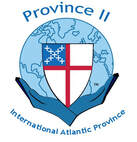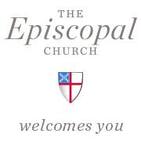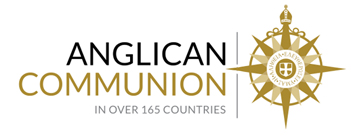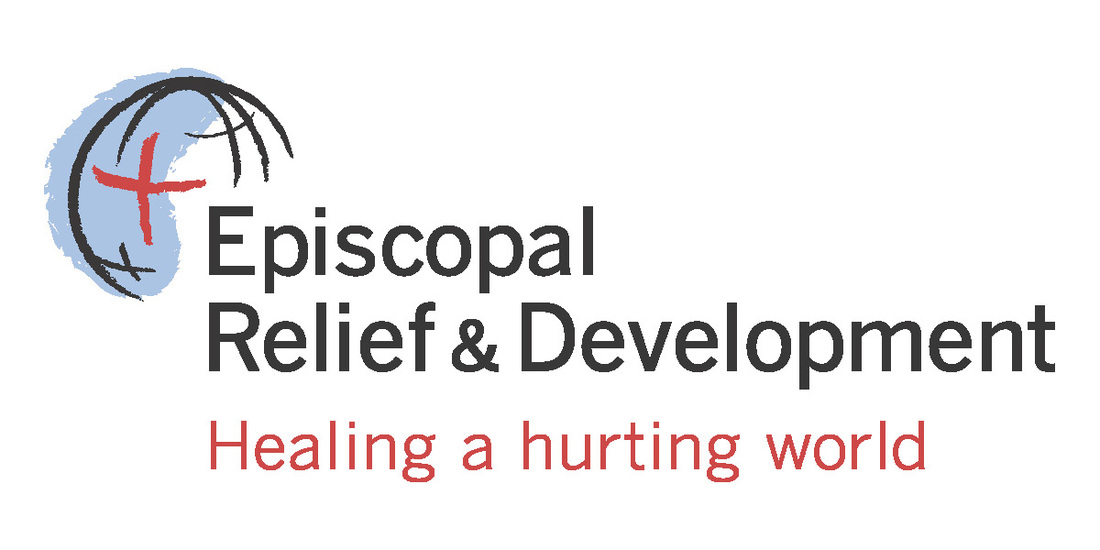|
Reintroducing John Jay’s Tabled Anti-Slavery Resolutions from 1860
In 1860, John Jay II introduced a group of anti-slavery resolutions at the annual convention of the Episcopal Diocese of New York . He met with opposition that is hard to comprehend today, but was very real then in a city which remained a major center of the slave trade, and the resolutions were "tabled." At the diocese's 2019 convention, its Reparations Committee will introduce a resolution calling for the 1860 resolutions to be reconsidered and adopted, and for the clergy and people of the diocese to "give effect to [their] letter and spirit." “As we continue our process of lamentations for slavery,” explains the committee, “this act is the right thing to do and will move us closer to the 2020 Diocesan Convention when we are calling on the Episcopal Diocese of New York to execute a formal apology for the sin of slavery.” This short video provides some background to the events of 1860, and why this action matters in 2019. Focus on Immigration/RefugeesThe issues and calls for ministry in the areas of immigration and refugees are not limited to the horrors on our southern border which are being featured in our news. The Episcopal Church has served immigrants new to the U.S. since the late 1800s, when the Church opened port chaplaincies to minister to sojourners on both coasts. In the 1930’s, local parishes collected donations to provide steamship passage for those fleeing Nazi Europe. The work of the Episcopal Migration Ministries has a website with much information: https://episcopalmigrationministries.org/. You can sign up on the website to receive their newsletter. But what is happening in Province II? Where are we called to ministry? Here is one story from the Rev. Diana Wilcox of the Diocese of Newark. My day on Capitol Hill advocating for refugees and asylum seekers When I registered several months ago for the Love God, Love Neighbor: Advocacy in Action event in Washington, DC, none of us – the organizers or the participants – could have imagined that our work on behalf of refugees would come during such an explosive news week. Just days prior, our nation grappled with the horror of the image of Óscar Alberto Martínez Ramírez and his 23-month-old daughter, Valeria, lying face-down in the waters of the Rio Grande, having died as they tried to cross from Mexico to the United States. The sin of our government’s policies was displayed for us all to see as I arrived on Capitol Hill to be trained and deployed for meetings with my state’s senators and representatives. The event was organized by Episcopal Migration Ministries (EMM), for which I am the diocesan liaison, and the Office of Government Relations (OGR) of The Episcopal Church. Having grown up in the DC area, and as a former employee of lobbying organizations and contractors for the US government, I was excited to return to my home turf in this new role as an advocate for refugees and asylum seekers. While I had walked the halls of Congress before on behalf of other causes, this felt far more important to me on a deeply personal level. Prior to our arrival, we were required to get up to date on the latest facts on asylum and the resettlement processes. We were also given links to our congressional representatives so that we could research their policy positions and legislative actions prior to meeting with them or their staff. We all met in the United Methodist building located between the US Supreme Court and the Senate office buildings on Maryland Avenue. The first day was jammed with training on advocacy, messaging, and practice for the meetings. We were provided with talking points, policy positions, specific asks and recommendations. I went back to my hotel and crammed for my meetings with the staff of New Jersey Senators Bob Menendez and Cory Booker, scheduled for the next day. EMM and OGR had done their work, it was now time for me to do mine. We were teamed with members of the local staff of either EMM, OGR, EPPN (Episcopal Public Policy Network), or another agency. However, it was made clear that this was our meeting, and that they would only engage as needed. My first meeting was at 10 AM with Alice Lugo, Counsel to Senator Menendez, and my policy expert was Kendall Martin, who serves as the Manager for Communications at EMM. My second meeting was at 1:30 PM with Daniel Smith, Counsel, Committee on the Judiciary, from Senator Booker’s office, and I was teamed with Jen Smyers, Director of Policy and Advocacy with the Church World Service. After the arranged meetings, I headed out to two other offices, both on the House side, which was a long walk past the Capitol in the high heat. First, to my own district’s congressman, Rep. Josh Gottheimer, whose office was closed. Next, at the request of Jen Smyers, to Rep. Chris Smith of the 4th district, a Republican who lobbied to restart the bipartisan Refugee Caucus. I left each office with materials, and met briefly with a staff member in Rep. Smith’s office, thanking the congressman for his courage. I ended the day walking back to my hotel in the blistering heat with sore feet, but a full heart. It is hard to describe the feeling of walking down those hallowed halls, but to have the opportunity to walk through the doors of governmental power to speak the gospel of Jesus to love God and neighbor was both empowering and humbling. It is my fervent hope that the relationships begun on this trip will continue as we work together to uphold the dignity of every human being, no matter where they are from, what language they speak, who they love, what faith they practice, what gender or race they are, for all are children of God, our sisters and brothers. If you want to get engaged, please join EMM's Partners in Welcome. The Rev. Diana Wilcox serves as Rector of Christ Church, Bloomfield/Glen Ridge. In Europe there is an entirely different situation. 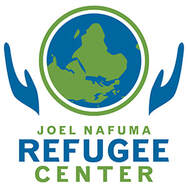 Operating in the crypt of St. Paul’s Within the Walls Episcopal Church in the heart of Rome, Italy, the Joel Nafuma Refugee Center (JNRC) (https://jnrc.it/) is a day center for refugees and asylum seekers to relax, learn, and receive advice in order to achieve their goals. JNRC works with diverse groups – from refugees to volunteers, donors, and students, providing a variety of services for guests daily, as well as coordinating and hosting fundraising projects and events throughout the year. From a featured news article: “One of the first stops for some refugees upon arrival in Rome is the basement of an American Episcopal church. Facing an Italian culture in which they’re frequently met with hostility, these people find a safe haven beneath St. Paul Within The Walls.” Many of the other congregations in the Convocation of Episcopal Churches in Europe have refugee ministries. 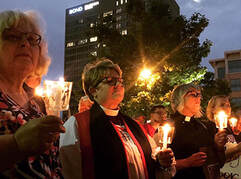 All over the province and the entire United States, July 12 saw Lights for Liberty demonstrations. The article in this newsletter from the Diocese of Newark is about participation by congregations throughout that diocese. The Rt. Rev. Dr. DeDe Duncan-Probe, Bishop of Central New York, spoke at the Syracuse Lights for Liberty vigil to end inhumane conditions in US migrant detention camps. “That children are being preyed upon, dehumanized, deprived of basic sanitation, and dying as a result of improper care within American detention centers at our border is not just wrong or embarrassing, it is a sin. “…America, criminalization is not an effective response in a humanitarian crisis. The adults and children at our southern border are not a political agenda or platform, they are humans and beloved children of God.” Bishop Chip Stokes (NJ) was in Maple Shade, New Jersey, with a group of people participating in Lights for Liberty. The event was hosted by the faithful of St. John's, Maple Shade, as a demonstration against the inhumane conditions facing today's immigrants, especially from Central America. Other events in New Jersey were in Collingswood, Hopewell, Lake Como, Metuchen, New Brunswick, Princeton, Red Bank, Atlantic City, and at the Elizabeth Detention Center.
What can you do? This is such a big problem with so many real issues involved that there is no easy answer. Diana Wilcox mentioned something at the end of her story, the Partners in Welcome network hosted by Episcopal Migration Ministries. This online network is a place for folks engaged in ministry to refugees, asylum-seekers, and immigrants to come together and share resources, information, ask questions, and get connected! It’s free to join and offers access to professionals in the field, people running amazing ministries, and people who are simply eager to learn how they help. For more information and to register: https://episcopalmigrationministries.org/wp-login.php?redirect_to=%2Fpartnersinwelcome. Over the past several weeks, The Episcopal Church has responded to the reports of inhumane conditions for children and other asylum seekers in government custody in a number of ways. This response includes calls for donations and goods from Episcopal dioceses on the border, prayers for those seeking safety, efforts to engage in advocacy, and pastoral messages from bishops around the Church. The list of resources for education and support is available on the EMM website at https://episcopalmigrationministries.org/response-to-the-border-education-and-advocacy/ and will continue to be updated with ways to learn more and take action. The OGR and EMM webinar with Bishop Michael Hunn of the Diocese of Rio Grande will be made available on-demand through this website as well. A new resource document, A Listening Service Toolkit, has been developed by a leadership team of the Episcopal Church and focuses on critical topics in the Episcopal Church and our society – sexual abuse, exploitation, and harassment.
“A Listening Service Toolkit clearly illustrates the seriousness of these issues and how the Episcopal Church leadership is committed to addressing these issues,” noted the Rt. Rev. Dr. DeDe Duncan-Probe of the Diocese of Central New York who chaired the effort. The 30-page resource document is available on the Province II website here. There is no fee to download this useful information. “The Toolkit addresses issues, outlines parameters and provides a liturgy,” noted Bishop A Listening Service Toolkit was born from the listening event at General Convention 2018. The Toolkit will be most useful to Diocesan ordained, lay and elected leadership. Bishop Duncan-Probe added. As noted in the opening letter of the Toolkit: The purpose of this toolkit is to share lessons learned in the planning and implementation of the 2018 General Convention House of Bishops Listening Liturgy, as a prayerful response to sexual abuse, exploitation, and harassment in the Church. It is the hope of the Listening Liturgy Leadership Team (LLLT) that this resource will offer support and empowerment for dioceses who may be considering a liturgical response of their own. First and foremost, a diocese must carefully discern if a Listening Liturgy would be efficacious, as it necessitates tremendous vulnerability and courage for the TruthTellers who courageously share their painful experiences, for the LLLT, for diocesan leadership, and for those who will serve on the Pastoral Care Response Team (PCRT) subsequent to the liturgy. It is important to note that, for the 2018 General Convention (GC79), we determined that a Listening Liturgy would be the most efficacious way for the gathered body to speak, hear, and respond to the abuses that take place in our Church. Liturgy offers a safe, secure “container” in which the truth of the most horrific abuses may be seen, heard, and held before the mercy and healing power of God in our midst. She noted that the Toolkit details “complex issues.” Among the topics included in the toolkit are: Overview of the Process; Building a Pastoral Reading Team to Reply to Letters/Early Work; Selecting Letters to Share and Preparing the Liturgy; Offering the Liturgy and Follow-Up; Pastoral Care Considerations; GC79 Listening Liturgy Text; Pastoral Care of the Victim/Survivors; and a Glossary of Terms. Updates will be provided on an ongoing basis as new information is available. For more information contact Bishop Duncan-Probe at [email protected]. Scroll down for the post in Spanish. Those of you who attended Provincial Synod last year may remember The Rev. Adrian Dannhauser’s workshop on the prevention of human trafficking made a true impact on those who attended the 2018 Provincial Synod. Now, the priest, who hails from the Diocese of New York, provided an update on the anti-human trafficking ministry. She reports it has been a busy and successful year, though sadly much work remains to be done:
So, what’s next? Looking forward, the Task Force is planning a Stations of the Cross service for victims and survivors of sex trafficking on Saturday, April 6. They will travel by bus around NYC to pray at specific locations where trafficking occurs. One example is Port Authority Bus Terminal, a prime spot for recruitment. If you are interested in joining in (or learning more about) the work of this important ministry please contact the Rev. Adrian Dannhauser at [email protected] or Neva Rae Fox at [email protected]. Actualización de servicios contra trata de personas—Provincia II, Febrero, 2019 Los que fueron presente al Sínodo Provincial el año pasado posiblemente atendieron el taller del Padre Adrian Dannhauser sobre como impedir trata de personas, y ganaron gran impacto. Ahora, el sacerdote, que es dentro la Diócesis de New York, ha actualizado los servicios suministrados. En Enero 2018, el Equipo Operativo contra trata de personas en la Diócesis de New York se unió con otros grupos similares en la ciudad de New York para presionar leyes contra Online Trata de Personas, aprobadas en el 2017 (legislación FOSTA-SESTA). Viajaron a Washington D.C., hablaron con la prensa, y después se presentaron en las oficinas de casi todos los miembros de la Cámara de Representantes para discutir esta ley, que provee la policía y los supervivientes con los instrumentos legales para perseguir los sitios web que facilitan trata de personas. FESTA-SOSTA llego a ser ley en Marzo, y eso fue una gran victoria pare supervivientes y victimas. El Equipo Operativo también propuso un grupo de resoluciones presentadas, y aceptadas, a la Convención General. Una de las resoluciones, considerada un Código de Conducta Para la Protección de los Niños, es un marco corporativo de responsabilidad social que ayuda compañías en la industria de turismo proteger niños de la explotación sexual. Las resoluciones animan a personas individuales, lo mismo como a las organizaciones en todos niveles de la Iglesia, priorizar y soportar los hoteles, líneas aéreas, y agencias de viajes que han firmado el Código, y a demás recomendar este Código con compañías que todavía no lo han firmado. Al mismo tiempo del pasaje de esas resoluciones, el Equipo Operativo lanzo’ un juego de herramientas, NOT IN MY HOTEL (QUE NO EN MI HOTEL!), para que comunidades de fe’ puedan recomendar el Código en sus propios vecindarios. Este programa se inició en la Iglesia de la Encarnación en New York, y con las experiencias de sus feligreses que continúan a recomendar el programa en hoteles de Manhattan por los dos años pasados. Los servicios contra trata de personas en la Iglesia de la Encarnación en la Diócesis de New York han introducido un nuevo programa, hablando con estudiantes jóvenes (de 14 a 18 años) para educarlos y posiblemente motivarlos a hacer todo que puedan. Demás, el Equipo planifica Estaciones de la Cruz el 6 de abril de 2019, viajando en autobús alrededor de New York, y rogando en los puestos típicos donde el trafico ocurre: estaciones de tren y autobús. También, hay un video disponible: Dios me Guía en la Lucha en Contra Trata de Personas, y otro mas corto, Mi Fe me Obliga Ser la Voz Para Esos sin Voz, publicados por Mujeres Reales, Cuentos Reales (Real Women Real Stories). Que puede hacer uno para educarse, y apoyar estos programas tan importantes? Por favor contactar Padre Adrian Dannhauser a [email protected] o Neva Rae Fox a [email protected] |
Archives
November 2019
Categories |



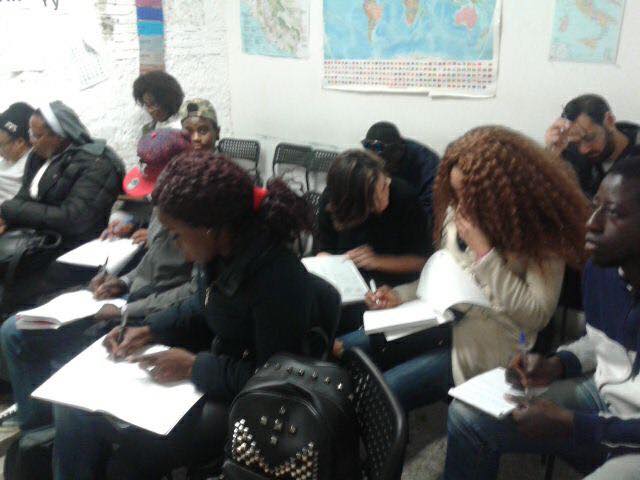
 RSS Feed
RSS Feed
